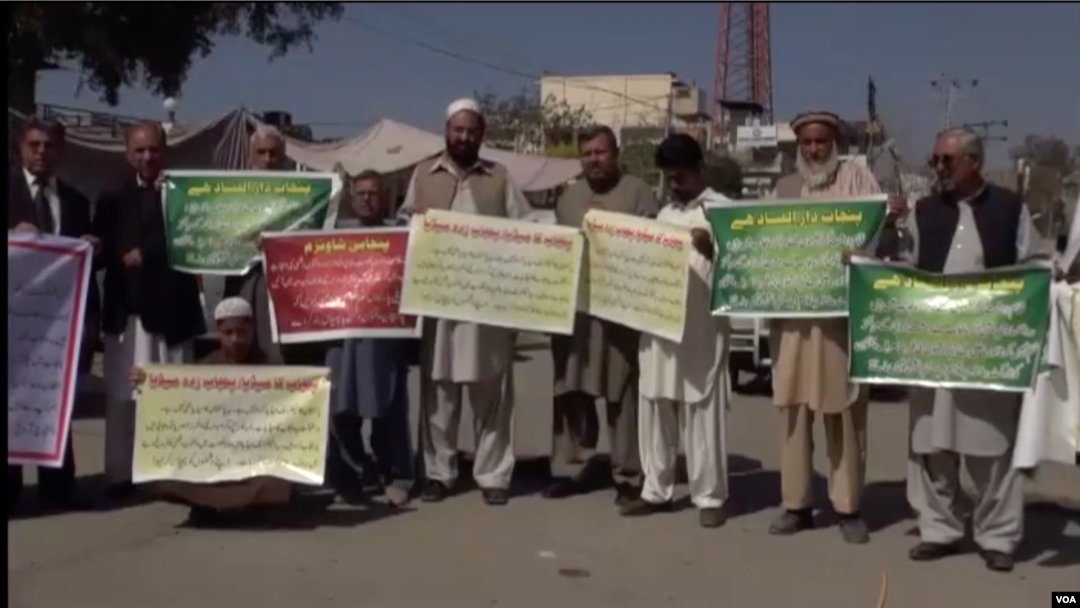Pashtuns have felt neglected and wrongly targeted in Pakistan for some time. But the death of a shopkeeper, who died in an alleged extrajudicial killing, led to a protest by some Pashtuns.
Naqeebullah Mehsud, 27, was killed January 13 in Karachi, the capital of Sindh province. Law enforcement authorities initially accused him of having ties with the Pakistani Taliban.
The charge was later dropped following an internal inquiry, and amid growing anger among Pashtuns, who viewed his death as an extrajudicial killing — when someone is killed by government officials without a sanctioned judicial proceeding.
Ordinary shopkeeper
Mehsud’s father, Muhammad Khan, told VOA that his son was not a terrorist but an ordinary shopkeeper who had moved to Karachi to open a shop and provide for his family.
“He was the kind of person who never touched a pistol, a gun or a knife, and was always against violence,” Khan said of his son.
Mehsud’s death mobilized thousands of Pashtun protesters to march from Dera Ismail Khan district in northwestern Khyber Pakhtunkhwa province to the capital, Islamabad, about 400 kilometers to the northwest.
In Islamabad, the Pashtuns held a 10-day peaceful protest against militancy and extrajudicial killings. It ended Saturday, but organizers said they would reconvene if their demands were not met by the government.
Manzoor Ahmad Pashteen, one of the main organizers of the protest, told VOA that Pashtuns are singled out in the country and wrongly targeted by the authorities.
“Since 2014, 400 to 500 cases of Pashtuns [mostly belonging to the Mehsud Tribe] have been killed in Karachi police encounters,” Pashteen said.
“Whether it is the issue of mines planted in our area or violence against ordinary people in the aftermath of a terror attack, we want the government to give us in writing that there will be no violence against ordinary people from now on,” he added.
Platform to raise voices
The reaction to the death of Mehsud provided a platform for all those affected by militancy and government military operations to raise their voices.
“Now it’s not just about the killing of Naqeebullah. It is about the people of FATA [Federally Administered Tribal Areas] and Khyber Pakhtunkhwa, who have been put in this war for decades,” Mohsin Dawar, a political activist from North Waziristan, told VOA.
Dawar referred to the suffering of the residents of seven tribal agencies of FATA, an area that borders Afghanistan.
“It is not about only North and South Waziristan but the whole Pashtun belt living on the periphery,” Noreen Naseer, a professor of political science at the University of Peshawar, told VOA, echoing Dawar’s concerns.
“This sit-in is an indication to the [state] that the young tribal men do not want to live under the old structures and old social contract,” Naseer added.
Dilemma
Militancy and military operations in the region have claimed the lives of many residents and forcibly displaced thousands of others.
Those who chose to remain in their homes have been subject to government interrogation and militant threats, activists say.
Malik Attaullah Jan, a resident of North Waziristan and a member of the FATA Grand Alliance, said he was picked up by security forces at a toll plaza in 2012 and held for 18 months before he was released.
Officials accused Attaullah Jan of harboring the Taliban. He denies the charges.
“The Taliban were so powerful. Anyone who owned a hujra [house] would be paid a visit by the Taliban. They would force their way in — you could not say no to the Taliban,” Attaullah Jan said.
Afterward, the government would come and accuse residents of sheltering militants, he added.
“They [security forces] would ask us if Baitullah came to our house, if the Taliban came to our house. And they tortured us for harboring them,” Attaullah Jan said.
Social media
Social media played a key role in the organization of the protest and in encouraging others to join the crowd.
The organizers, mainly youths, took to social media, including Facebook and Twitter, and created the hashtag #PashtunLongMarch, which motivated Pashtuns from different parts of Pakistan to join with the cause and raise their voices.
Pashtun women, considered conservative by some, joined in the protest in large numbers, too.
“Many Wazirs [a Pashtun tribe] from Karachi joined the protest. I came from Lahore to join the protest,” Azra Nafees Yousufzai, a women's rights activist in the protest, told VOA.
“The crowd was peaceful, yet the speeches were very emotional and based on real facts,” she said.
Prominent figures, including Malala Yousafzai, the Nobel Peace Prize laureate, and Pashtun political leaders, announced their solidarity with the protesters.
In a series of tweets, Afghan President Ashraf Ghani said the Pashtun march was a positive initiation against fundamentalism.
“This is the most organized and well-put protest I have come across recently. I am happy to see that Pashtun have put their demands to the government in a very organized manner,” Afrasiab Khattak, a Pashtun political leader, told VOA.
Media coverage
Organizers criticized local Pakistani media outlets for not covering the protests.
“If an animal falls into a gutter, media would be all over the news. Our march continued peacefully for weeks and the local media did not cover us,” activist and organizer Pashteen said. “We gathered in Islamabad against this very discrimination that’s present in the system against us.”
VOA Deewa contributed to this report.


